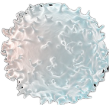
Human Neutrophil Antigen
HNA (Human Neutrophil Antigen) refers to a class of antigens specifically expressed on neutrophils and is widely used in the study of neutrophil-related diseases and immune responses. The most important antigens in the HNA system include HNA-1, HNA-2, HNA-3, HNA-4, and HNA-5.
HNA-1 antigens primarily include HNA-1a, HNA-1b, HNA-1c, and HNA-1d. Among these, HNA-1b (NA2) and HNA-1c (SH) are typically produced due to mutations in the FCGR3B gene.
HNA-2a (NB1) is another significant neutrophil-specific antigen, present not only on the cell membrane but also on the membranes of small vesicles and specific granules, with increased expression upon neutrophil activation. Although the function of HNA-2a is not fully understood, it is thought to have receptor functionality. The characteristic feature of HNA-2a is its expression on only certain subpopulations of neutrophils, with the expression level remaining relatively stable within an individual. HNA-2a deficiency is usually caused by intron fragments in the mature mRNA rather than gene deletion.
HNA-3a antigen is known to be associated with severe cases of transfusion-related acute lung injury (TRALI). Additionally, HNA-4a and HNA-5a are antigens caused by single nucleotide substitutions, located on the αM (CD11b) and αL (CD11a) chains of the leukocyte β2 integrin, respectively.
Overview
Ruijin Hospital, Shanghai Jiao Tong University School of Medicine All rights reserved
Overview of Database Data Collection
This database aims to provide comprehensive blood group systems and immunity-related data to researchers, clinicians, and experts in related fields. Currently, the database includes a wealth of information on blood groups and immunity, specifically encompassing 47 blood group systems within the red blood cell blood group system, comprising a total of 2,556 alleles. It also includes 35 human platelet antigen (HPA) types of platelet-related antigens and 98 CD36-related antigens. Additionally, the database contains 25 alleles of human neutrophil antigens (HNA) and detailed information on 70 alleles of immunoglobulin allotypes.

